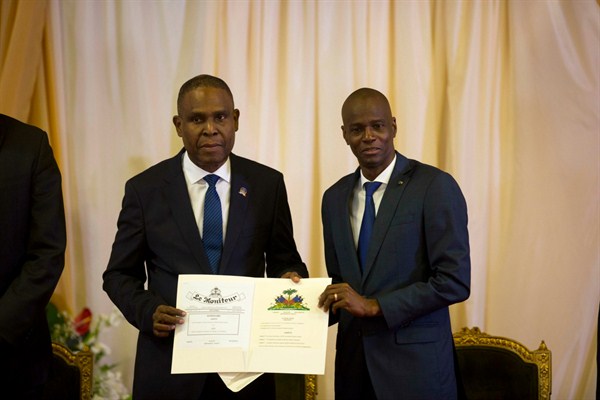Months after deadly riots in Port-au-Prince forced the resignation of Haitian Prime Minister Jack Guy Lafontant, a new government is finally in place. But newly sworn-in Prime Minister Henry Ceant faces a slew of roadblocks, including a major corruption scandal and a yawning budget deficit. Ceant also lacks previous administrative experience and is viewed with suspicion by much of the Haitian political elite. In an email interview with WPR, Francois Pierre-Louis, a former Haitian government official who is now a professor of political science at Queens College, the City University of New York, explains why the new government in Port-au-Prince is ill-equipped to tackle Haiti’s many pressing challenges.
World Politics Review: What accounts for the delay in putting a new government in place after Lafontant’s resignation in July, and what led to the appointment of Ceant as his successor?
Francois Pierre-Louis: The riots that took place in Haiti on July 6 and 7—triggered by the government’s decision to end annual fuel subsidies, effectively raising the price of fuel by 50 percent—were unprecedented in the annals of popular uprisings in Haiti. This was the first time since the fall of Jean-Claude “Baby Doc” Duvalier in 1986 that rioters targeted businesses in a wealthy suburb outside the capital, Port-au-Prince. Most of the businesses targeted by rioters were hotels, car dealerships and supermarkets that are owned by the country’s elite—primarily foreigners and light-skinned Haitians. The scope of the riots and the absence of law enforcement in the streets during those two days highlighted internal disagreements and a lack of coordination in the government over the decision to end the fuel subsidies. President Jovenel Moise was ambivalent about the measure, but in the end, three Cabinet ministers moved forward with the announcement without consulting the chief of police or the president’s staff. Lafontant’s administration, widely seen as aloof and ineffective, was paralyzed as a result, but Moise did not want him to resign. Moise was happy to have a weak prime minister because it gave him the opportunity to play the role of president and prime minister at the same time. Nevertheless, he was forced to accept Lafontant’s resignation due to the fallout from the riots.

